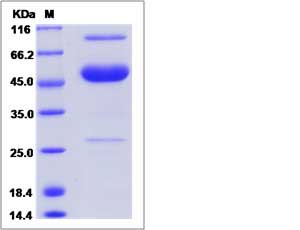Cynomolgus / Rhesus M-CSF / CSF-1 Protein (Fc Tag)
M-CSF, CSF-1
- 100ug (NPP4423) Please inquiry
| Catalog Number | P90029-C02H |
|---|---|
| Organism Species | Cynomolgus |
| Host | Human Cells |
| Synonyms | M-CSF, CSF-1 |
| Molecular Weight | The recombinant cynomolgus CSF1 consists of 396 amino acids and predicts a molecular mass of 45.1 kDa. |
| predicted N | Glu 33 |
| SDS-PAGE |  |
| Purity | > (15.1+79.5+4.6) % as determined by SDS-PAGE. |
| Protein Construction | A DNA sequence encoding the cynomolgus CSF1 (XP_005542489.1) (Met1-Asn190) was expressed with the Fc region of human IgG1 at the C-terminus. Cynomolgus and Rhesus CSF1 sequences are identical. |
| Bio-activity | |
| Research Area | Immunology |Inflammation / Inflammatory Mediator |Cells Involved in Inflammation |Myeloid-derived Suppressor Cells (MDSC) |
| Formulation | Lyophilized from sterile PBS, pH 7.4. 1. Normally 5 % - 8 % trehalose and mannitol are added as protectants before lyophilization. Specific concentrations are included in the hardcopy of COA. |
| Background | Macrophage colony-stimulating factor 1, also known as CSF-1, M-CSF, Lanimostim and CSF1, is a single-pass membrane protein which is disulfide-linked as a homodimer or heterodimer. Granulocyte / macrophage colony-stimulating factors are cytokines that act in hematopoiesis by controlling the production, differentiation, and function of 2 related white cell populations of the blood, the granulocytes and the monocytes-macrophages. M-CSF/CSF-1 is known to facilitate monocyte survival, monocyte-to-macrophage conversion, and macrophage proliferation. M-CSF/CSF-1 is a secreted cytokine which influences hemopoietic stem cells to differentiate into macrophages or other related cell types. It binds to the Colony stimulating factor 1 receptor. M-CSF/CSF-1 may also be involved in development of the placenta. The active form of M-CSF/CSF-1 is found extracellularly as a disulfide-linked homodimer, and is thought to be produced by proteolytic cleavage of membrane-bound precursors. M-CSF/CSF-1 induces cells of the monocyte/macrophage lineage. It also plays a role in immunological defenses, bone metabolism, lipoproteins clearance, fertility and pregnancy. Upregulation of M-CSF/CSF-1 in the infarcted myocardium may have an active role in healing not only through its effects on cells of monocyte/macrophage lineage, but also by regulating endothelial cell chemokine expression. |
| Reference |
|
